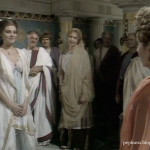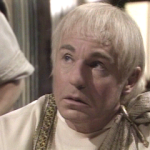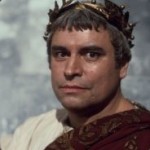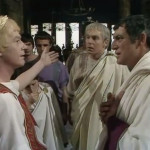Younger readers who don’t remember I, Claudius, the 1976 TV adaptation of the two Robert Graves novels, I, Claudius and Claudius the God, may wonder what all the fuss was about. Lots of period drama set around the louche lifestyles and murderous intrigue of generations of Roman Emperors (whom even the Borgias failed to emulate), they may say, plus a few well-known faces looking relatively youthful.
In fact summing up the series thus fails to do any justice at all to arguably the single greatest historical drama series ever broadcast. In the face of the likes of Brideshead Revisited, Pride and Prejudice, Bleak House and very many more that’s a pretty big claim, one deserving of a full rationale; so my objective here is to justify why I rate this particular adaptation so highly.
My argument comes in five parts, so without more ado let’s explore them:
1) Staging Scale and Scope
Bearing in mind this is a series made entirely within the confines of BBC TV Centre studios, it recreates the breadth and depth of the Roman Empire from the perspective of Tiberius Claudius Caesar Augustus Germanicus to stunning effect, a combination of the late Jack Pulman‘s breathtaking script and Herbert Wise‘s direction that give an optical illusion – at once paradoxically expansive yet strangely claustrophobic – the studio effect seems so apt for the cloistered world of Roman Emperors, many of whom went out to explore their Empires but in Rome justifiably lived in fear of those around them.
On reflection, maybe what I like about the staging is that it retains the vestiges of theatricality, which some hate but I rather enjoy!
2) Historical Drama
Not only that but the passage of time and the historical narrative is handled with great assurance and clarity, no mean feat in view of the complexity of relationships in the Roman caesural lineage. More than that: It puts emotion and intrigue into decisions, provides a narrative drive and tension behind what are well-known facts, albeit with some fictional twists. They do say life is stranger than fiction, and here is the proof!
Of course, it’s told from the perspective of Claudius, which, like Salieri in Amadeus, might be an unreliable memoir, but at every turn it breathes life into the historical facts and figures better than any David Starkey, Michael Wood or Niall Ferguson.
In spite of the saga lasting generations and incorporating many characters, the narrative drive and scheming logic never fail. From beginning to end this is riveting drama, told with guile and purpose.
3) Characters
The joy of dramatisations and fiction based on real life is that you would never dare create the characters in fiction. They are more outrageous than anything you could possibly dream up! Claudius himself is more than a little wily, but all around him the most bizarre characters appear, most transcribed from known sources by Graves with little added or taken away. Everywhere you look, from the divisive Livia, vicious Tiberius, loopy Caligula and loopier Nero, nymphomaniacs Julia and Messalina, and many many more. Make no mistake, this was a golden era of nutcases and eccentrics alike.
4) Casting & Acting
Let’s face it, Derek Jacobi as Claudius is towering, the fulcrum on which the drama turns. Not only has he perfected the art of a limp, stammer and nervous twitch better than any actor in history, but his presence as the reluctant caesar and chronicler of the times is immense. This was a very fine performance, captured for posterity, from the very young to the very old Claudius.
B-b-b-b-but it was far from being alone. Great jewels of acting shine out at every turn, being memorable. Once you’ve seen John Hurt as the barking mad but hideously evil Caligula, how could you possibly forget that cameo? Nor indeed Brian Blessed as the blustering, eye-swivelling but convivial Augustus, and Siân Philips as the wickedly Machiavellian Livia? It’s unfair to single out particular actors, since Claudius works best as an ensemble piece, and I doubt if the BBC ever assembled a greater ensemble cast for any period drama.
Look at the cast list and it’s almost a who’s who of British acting talent from the 70s:
5) Quality
This series amounts to 600 minutes of TV over 5 DVDs. It is riveting, compelling viewing from start to last. The theme music by the late Wilfred Josephs alone is enough to make the hairs on the back of your neck stand on end.
Don’t just take my word for it though. Here are a couple more reviews taken from imdb.com’s entry on the series:
After reading the reviews on IMDb, I bought the DVD set. I have watched the series countless times since and still continue to marvel at the quality of this work.
For anyone unfamiliar with the early Roman principate, the Julio-Claudian dynasty was in power for a period of about 80 years from Augustus to the death of Nero in 68 AD. This TV series covers the period from about 20 BC to 54 AD – the death of emperor Claudius.
The story is semi-autobiographical, written by Claudius towards the end of his reign and covering the history of his family from Augustus down to the young Nero, his successor.
Murder is the dominating theme, as Augustus’ wife Livia artfully dispatches one imperial contender after another so that her son Tiberius can be emperor. It is not simply vanity that drives her machinations, but she is convinced that only Tiberius can keep the principate intact. Should any other candidate take over from Augustus, Rome would descend into civil war and anarchy. It is mostly Livia’s actions that drives the story forward.
The acting is top notch. Much has been made about Derek Jacobi’s performance, as the lame, stammering, clumsy Claudius. His family does not think much of him, but it is obvious to the viewer that he is a lot smarter and observant then he looks, as he absorbs all the goings on around him to chronicle them later in his book. Jacobi’s performance deserves to go into legend, but the quality of the other performances does not allow him to run away with the film. Brian Blessed as the benevolent Augustus, Sian Philipps as Livia are fantastic. George Baker as Tiberius is very good in a particularly difficult role while John Hurt has the most interesting role to play – that of the madman emperor Caligula. The vast supporting cast are all excellent, particularly Patrick Stewart as Sejanus – Tiberius’ tough, ruthless and scheming head of the Praetorian Guard.
Considering this is a BBC series with limited budget the production values are great. Direction is first class. Herbert Wise handles the vast story and the army of superb actors with great assurance.
For a drama series the story is quite accurate with history. Just two minor gripes. First the part of Tiberius as written portrays him as very much under the thumb of his mother, with a weak will and indecisive nature. Certain historical facts have contributed to this impression, such as him divorcing the wife he loved to marry Augustus’ daughter. But the real life Tiberius was also very efficient and competent, keeping the empire stable during his 23 year reign and leaving the treasury rich. In this series his virtues are not highlighted enough.
Secondly the performance of John Hurt as Caligula. Herbert Wise himself expressed his astonishment at the greatness of Hurt’s performance and Hurt certainly gives it a real go. But personally I was disappointed in the way Caligula was portrayed by Hurt. In his interpretation Caligula is a one dimensional madman with cruelty as his dominating urge. No one could disagree given the historical facts, but perhaps due to the freedom allowed in this role Caligula could have been portrayed with more depth, rather than a screaming shouting spoilt young man who believes himself a god. The real Caligula did believe himself to be a god, but perhaps as a result of the absolute power he held in his hands rather than some sort of mental disease. In the way Hurt has chosen to play the role he plays it well. But a more sophisticated interpretation would have rendered Caligula even more believable, and more frightening.
This series has everything, even length – it runs to over 600 minutes. The quality is unwavering throughout. A real treasure to own. It is extremely rare for a work of this quality to be to be realised over such a length, all the more pleasurable for the viewer.
Several writers here have commented that I, Claudius is the greatest ever TV series, the series by which all other TV work should be judged. I cannot agree more.
And another:
In writing his epic novels `I, Claudius’ and `Claudius the God’, from which this series is adapted, Robert Graves reinvented the genre of historical fiction. And he could hardly have chosen a more fascinating subject than the Julio-Claudian dynasty. Even a tame retelling, based strictly on verified historical fact, would have made an interesting tale. But by embracing the lurid, sensationalistic hyperbole heaped upon the founders of the Roman Empire by later writers (Suetonius and Tacitus in particular), Graves concocted the ultimate in dysfunctional families, weaving a tale of scandal and debauchery capable of shocking even the most jaded of modern audiences. The more eminent classicists, naturally, sneered, as eminent classicists tend to do toward anything that threatens to make the ancient world more accessible to `hoi polloi’. One is forced to admit that, as history, Graves’ juicy narrative is bunk. But o ye gods, what enjoyable bunk it is!
The drama gives an insider’s view of the Julio-Claudian Dynasty, the first emperors of Rome. Over the course of his long reign, Augustus has managed to bring peace to his nation after nearly a century of off-and-on civil wars. But he remains a man divided, hoping for the eventual return of the old Republican government, but knowing that the best hope for a lasting peace is the continued concentration of power in a single person. Augustus therefore sets himself to the task of grooming a successor, one who shares his dream and will continue laying the foundations for the restoration of the Republic. His wife, however, Livia Drusilla, is determined to thwart his plans, and embarks on a slow, murderous scheme to place her own son (whom she fancies she can control) on the throne. The tale is told through the eyes of Claudius, step-grandson to Augustus, who suffered from the crippling effects of a childhood illness and was thus despised and ignored by much of his own family. Regarded as an idiot and of no threat to anyone, he alone remains standing while the poison flows and the daggers flash. To the surprise of all (none the least himself) this drooling, stuttering, limping old fool turns out not to be such a fool after all, and in one of history’s great ironies, wins the prize everyone but he is after: absolute power.
Again, the historical facts alone make this an interesting tale. But it is the tantalizing glimpse into the inner workings of the world’s first `First Family’ that makes `I, Claudius’ so much fun. Bill Clinton’s philandering and the endless public spectacle that is the British Royals just seem so incredibly dull and tame compared with the bad behavior of Augustus’ clan. Matricide, patricide, fratricide, regicide, suicide, incest, rape, pedophilia.and that’s on a slow day. Poisonings, stabbings, betrayals, double-crosses, triple-crosses, madness. And one gentle soul sitting in the corner watching it all. Robert Graves’ story brings out the tremendous irony of a nation finally at peace with itself, but ruled by a family embroiled in its very own civil war. It’s the sort of sordid tale one finds only in the most disreputable of tabloids, but then rendered in gorgeous prose and delivered by the finest actors. To the uninitiated, it might best be described as a guilty pleasure cleverly masquerading as a stuffy British period drama.
I don’t think anyone could have hoped for a more faithful transition from book to film than what the BBC achieved. Working with a 12+ hour running time, screenwriter Jack Pulman was not forced to content himself with a `Cliff’s Notes’ version of the story. Events progress in a naturally expansive manner, and characters grow and mature (or fail to do so) believably over time. In recreating the novels for the stage (after all, let’s face it – this is predominantly a televised stage play) Pulman was constrained only by a modest budget and the limitations of the television studio. Action is confined to indoor sets, and the more spectacular aspects of daily life in ancient Rome (attending the Circus Maximus, for example) are left to the viewer’s imagination, hinted at by the sounds of roaring crowds but never actually seen. For those audience members not put off by such, or by the drab color and lighting usually reserved for daytime soap operas, the entire production is a treat from beginning to end.
The acting is superb at every turn. Derek Jacobi lends tremendous dignity to his portrayal of Claudius, whose physical handicaps might have come off as insulting or hammy from a lesser actor. He is utterly believable as the `wise’ fool, the only person in the entire family NOT scheming for power, and therefore the only one worthy of it. As Livia, Siân Phillips is a study in controlled, cunning evil. The role is reminiscent of Eleanor of Aquitaine in `The Lion in Winter’, except that even Katherine Hepburn’s Oscar-wining performance in that film is utterly outdone here (ironically, Siân Phillips also played the role of Queen Eleanor, in the BBC’s adaptation of `Ivanhoe’). John Hurt’s gleefully decadent turn as Caligula is fascinating to watch. Hurt’s eyes, throughout his portrayal, remain chillingly cold and lifeless even as he smiles and laughs – except of course, for his expression of shock upon realizing that his sister Drusilla is, in fact, mortal. The most impressive moment in the entire production, however, came from Brian Blessed (Augustus), whose slow, quiet, passing away remains the most convincing screen death I have ever witnessed.
There are simply not enough superlatives in the English language to express my opinion of the towering triumph that is `I, Claudius’. And seeing the 9.5 user rating here on the IMDB, apparently I’m not alone.









